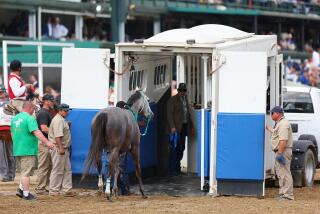Family Critical of Care at Track
- Share via
The family of Glenn Webster, with the support of a registered nurse who rushed to help, is critical of the emergency treatment the Churchill Downs outrider received when he suffered a heart attack the day before last year’s Kentucky Derby. Webster, 43, died in a Louisville hospital two days later.
Paul Webster, younger brother of the outrider, and Anna VanDyke, a nurse from Hot Springs, Ark., both said that emergency medical technicians might have done more to help Glenn Webster.
“It was apparent that the basic CPR protocol was not followed,” VanDyke said. “In an emergency situation, untrained people or maybe inadequately trained people tend to react differently. I am concerned about the policy and procedure of emergency response that [was] in place at Churchill Downs.”
Paul Webster, a jockeys’ valet at Turfway Park in Florence, Ky., and former assistant clerk of scales at Churchill Downs, said that his parents did not plan to sue. “We realize that nothing we do will bring Glenn back,” he said. “But my mother is still very torn up over this and we’d like to improve the system to help somebody else who might be in the same situation.”
Churchill Downs officials declined to comment, but David Richardson, a Louisville surgeon who is a horse owner and member of the track’s racing committee, said that Webster’s death was reviewed and that the panel was satisfied that the EMTs had done all they could.
“The EMTs are to be congratulated,” Richardson said. “They kept Glenn alive and got him to the hospital for more extensive treatment. The only changes that came from our review were to recommend better positioning of emergency vehicles on big days at the track.”
Outriders form a mounted patrol that escorts horses on the track during pre-race post parades. Sometimes required to chase down runaway horses, outriders remain on the track until horses are pulled up after races.
Glenn Webster was the head outrider at Churchill Downs, having worked the job since 1986.
On May 4, 2001, with a crowd of 102,904 on hand for the running of the Kentucky Oaks, Webster and another outrider were on the backstretch after the race, near the three-quarters pole, when Webster grabbed his chest and fell to the ground.
VanDyke, the wife of a retired jockey, said she had watched the race from the barn area and went to help.
“When it was determined that he didn’t have a pulse, one of the EMTs started CPR,” VanDyke said. “But her hand position on his chest was [incorrect]. At this point, he stopped breathing. I asked for an oral airway, but I was brought a nasal airway. The EMT was unable to insert the nasal airway. I asked again for an oral airway and was brought one.”
Paul Webster said that there was so much damage done to his brother’s face that had he survived, he would have needed reconstructive nose surgery. Webster added that Bob Bailey, director of security at Churchill Downs, would not give him a copy of the accident report.
VanDyke said, “I had someone in my arms who was dying. When you see something like that happening and see what’s being done, it’s very disturbing.”
More to Read
Go beyond the scoreboard
Get the latest on L.A.'s teams in the daily Sports Report newsletter.
You may occasionally receive promotional content from the Los Angeles Times.










